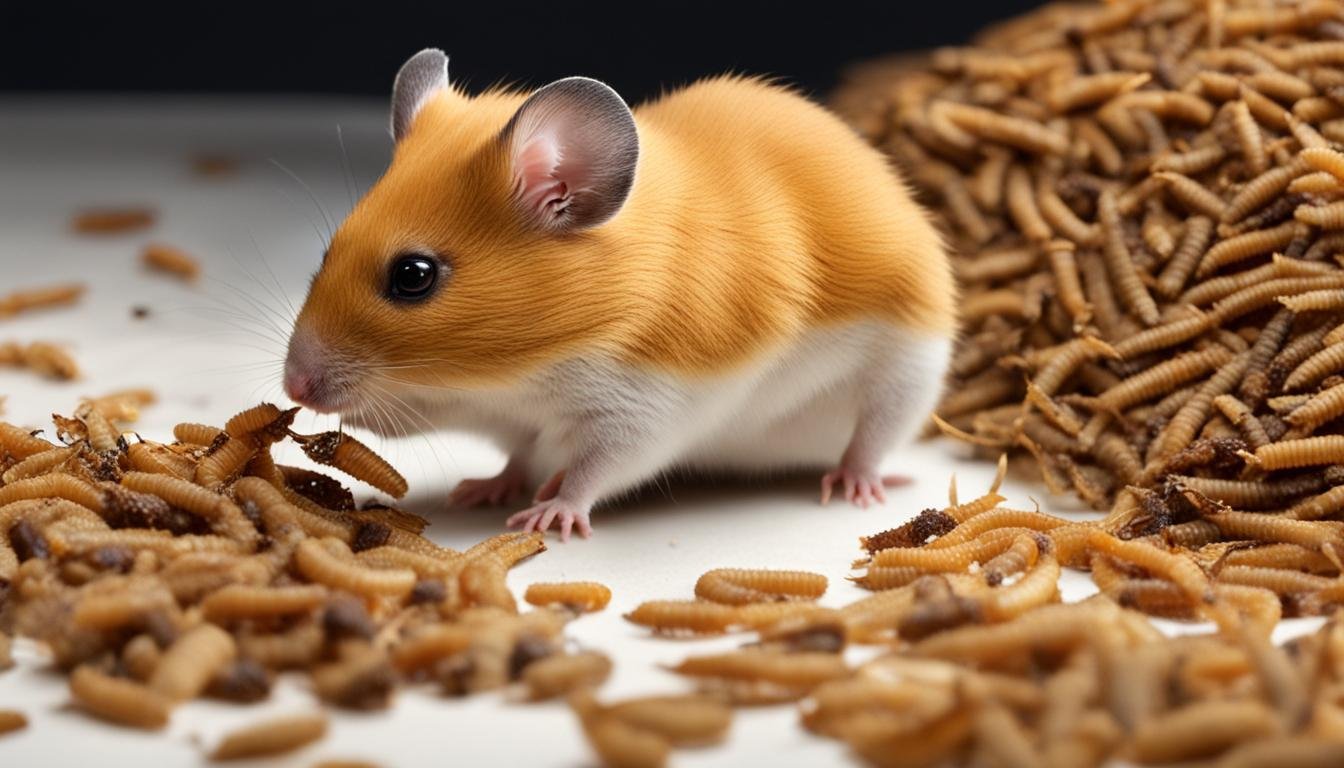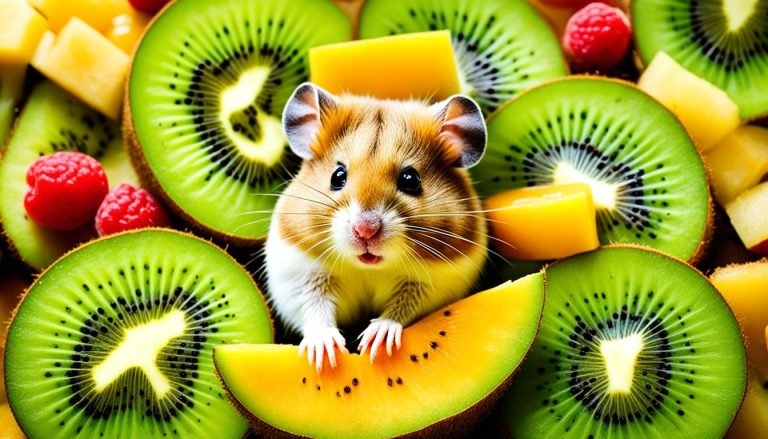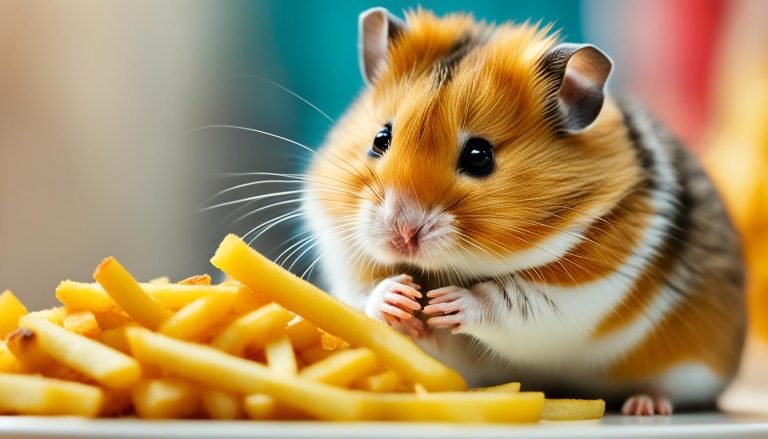Can Hamsters Eat Mealworms? Safe Snack Guide
Today, I want to shed some light on a common question many hamster owners have: Can hamsters eat mealworms?
Well, the short answer is yes! Mealworms can be a safe and beneficial snack for our furry little friends. They not only provide essential protein but also offer a range of nutrients, including vitamins, minerals, fiber, and fatty acids.
When it comes to feeding our hamsters mealworms, moderation is key. These tasty treats can be incorporated into their diet as part of a balanced meal plan. But before we dive into the details of how and where to feed mealworms to hamsters, let’s take a closer look at the health benefits they offer.
Key Takeaways:
- Mealworms are a safe and nutritious snack for hamsters.
- They provide essential protein and a variety of nutrients, including vitamins, minerals, fiber, and fatty acids.
- Feeding mealworms in moderation is essential, taking into account the hamster’s size and dietary requirements.
- Mealworms can be served to hamsters in different forms – live, dried, or rehydrated.
- When purchasing mealworms, options are available both in local pet shops and online.
Health Benefits of Mealworms for Hamsters
Mealworms offer numerous health benefits to hamsters, making them an excellent addition to their diet. These tiny creatures are packed with essential nutrients that support their overall well-being.
Rich Source of Protein
One of the key advantages of mealworms for hamsters is their high protein content. Protein is essential for muscle growth, tissue repair, and hormone production. By including mealworms in their diet, hamsters can maintain strong muscles and a healthy hormonal balance.
Supports Digestive Health
Mealworms are also rich in fiber, which aids in digestion. Fiber promotes regular bowel movements and helps prevent digestive issues in hamsters. By incorporating mealworms into their diet, hamsters can maintain a healthy digestive system.
Packed with Vitamins and Minerals
Mealworms are a natural source of vitamins and minerals that are vital for hamsters’ overall health. These nutrients include vitamin B complex, vitamin E, iron, and zinc. These vitamins and minerals support various bodily functions and help keep hamsters in peak condition.
Enhances Energy Levels
With their high protein content and essential nutrients, mealworms provide hamsters with a natural energy boost. The nutrients found in mealworms help hamsters maintain high energy levels, allowing them to engage in their natural behaviors with vigor and vitality.
Introducing mealworms into your hamster’s diet can offer these incredible health benefits and contribute to their overall well-being. However, it’s essential to keep in mind that mealworms should be fed in moderation and as part of a balanced diet that includes other hamster-friendly foods.
Can Hamsters Eat Mealworms Daily? How to Feed Mealworms to Hamsters

When it comes to incorporating mealworms into a hamster’s diet, there are a few things to consider. Hamsters can consume mealworms in different forms – live, dried, or rehydrated – based on their preferences and your availability of these options.
Live Mealworms:
If you choose to feed your hamster live mealworms, it’s essential to crush the heads of the mealworms before offering them. This helps prevent biting and potential injury to your hamster. Hamsters may be more interested in chasing and capturing live mealworms, which can provide mental stimulation and encourage natural foraging behaviors.
Dried Mealworms:
Dried mealworms are a convenient option as they have a long shelf life and are readily available in pet stores, department stores, and online. They provide the same nutritional benefits as live mealworms but without the need for preparation. You can either offer dried mealworms as a standalone treat or mix them in with your hamster’s regular food.
Rehydrated Mealworms:
For hamsters that prefer a softer texture, rehydrated mealworms may be a good option. To rehydrate them, soak the dried mealworms in water for a few minutes until they become moist and plump. This can make the mealworms more appealing to some hamsters and easier to chew and digest.
Regardless of the form you choose, it’s important to feed mealworms to hamsters in moderation. The quantity depends on the size and dietary requirements of your hamster. Always consider mealworms as a supplement to your hamster’s balanced diet, which should include hamster pellets, fresh vegetables, and fruits.
Where to Buy Mealworms for Hamsters
When it comes to purchasing mealworms for your hamster, you have several options available. Here are some places where you can find mealworms:
- Pet shops: Many pet shops and pet supply stores carry mealworms as they are a popular treat for small animals like hamsters. These stores often have different options, including live mealworms that your hamster can enjoy.
- Department stores: Some department stores also have a pet section where you might find mealworms for hamsters. While the selection may not be as extensive as in pet shops, it’s worth checking out if you’re already there.
- Online suppliers: If you prefer the convenience of online shopping, several suppliers specialize in breeding and selling mealworms. They offer a wide range of options, including live, dried, and rehydrated mealworms.
- Bird food or outdoor sections: Dried mealworms can often be found in the bird food or outdoor sections of stores. These dried treats are commonly used to attract birds, but they can also be suitable for hamsters.
Alternatively, some hamster owners choose to breed their mealworms. This can be a cost-effective option if you have the time and resources to do so. Breeding mealworms allows you to have a constant supply of fresh mealworms for your hamster without having to make frequent purchases.
Choosing the Best Option
When deciding where to buy mealworms for your hamster, consider factors such as convenience, availability, and your hamster’s preferences. Live mealworms may provide a more interactive experience for your hamster, while dried mealworms offer convenience and a longer shelf life. Ultimately, the choice depends on what works best for you and your furry friend.
Final Thoughts
In conclusion, mealworms are a safe and nutritious snack option for hamsters. They provide essential protein, vitamins, and minerals that support their overall health and well-being. However, it’s crucial to feed mealworms in moderation and ensure they are part of a balanced diet that includes hamster pellets, fresh vegetables, and fruits.
While mealworms can be a beneficial supplement to a hamster’s food, it’s important to remember that they should not be the sole source of nutrition. Hamsters have specific dietary requirements, and a varied diet ensures they receive all the necessary nutrients for optimal health.
If you have any concerns about your hamster’s weight or overall health, it’s always a good idea to consult a veterinarian. They can guide the appropriate amount of mealworms to feed your hamster and ensure their diet is meeting their specific needs.
Similar Posts
- Can Hamsters Eat Crackers? Safe Snack Tips.
- Can Hamsters Eat Asparagus? Safe Feeding Guide
- Can Hamsters Eat Peaches? Safe Snacking Tips
- Can Hamsters Eat Cilantro? Safe Herb Guide
- Can Hamsters Eat Cantaloupe? Find Out
- Can Hamsters Eat Avocado? Diet Safety Tips
- Can Hamsters Eat Pineapple? Safe Snack Guide
- Can Hamsters Eat Green Beans? A Complete Guide
- Can Hamsters Eat Blackberries? Safe Treat Tips
- Can Hamsters Eat Popcorn? Safe Snack Tips
- Can Hamsters Eat Salami? Here’s Why Vets Say No







